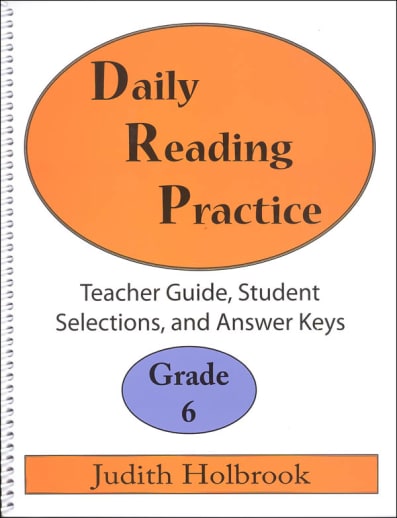Students work with one reading selection each week. They study that selection each day and complete such tasks as identifying subject and purpose on Monday, engaging in word study on Tuesday, making inferences and relating to prior knowledge on Wednesday, creating graphic organizers and skimming on Thursday, and writing summaries on Friday.
Each level of Daily Reading Practice contains 30 high-interest reading selections with related questions and assignments. Selections cover a variety of subject areas and prepare students to handle passages on standardized tests. Student "help pages" provide useful information about everything from root words to literary techniques to summarizing skills. Students can complete the short, daily reviews with or without workbooks.Daily Reading Practice Teacher Guide Grade 6
Description
This is a reading comprehension series based on the belief that students should do quick, short, daily reviews on a regular basis so that reading skills will be forced into long-term memory. As teachers we often use such techniques in learning math skills, for example. Why not apply it to reading? This series applies the same methodology used in Daily Grammar Practice and is also by the same author as Focused Writing: Elementary Writing Practice.
Each level’s Student Workbook (one per student) provides an introduction to the program, a quick weekly reference guide (an overview of the weekly focus skills), and daily directions with space to record answers. Each weekday, no matter their level, students work the same targeted reading skills—just at their own level. The activities become more in depth as the week progresses, and also as students progress yearly through the levels. For example, every Monday after reading that week’s selection for the first time, students will review how to determine the passage’s main subject and how to construct titles. Every Thursday, students will focus on the main idea/thesis, find problems in the selection and sometimes use graphic organizers to understand the text. So, with each daily activity, students return to that week’s reading assignment, seeing it “afresh” with a new task. In addition, certain skills are introduced at certain times. For example, identifying allusion and other literary skills are introduced in 9th grade; identifying rhyming words is only focused on in the first through third grades. Student Workbooks are consumable, non-reproducible, soft-cover and come 3-hole punched (40 pp).
The Teacher Guides include an introduction to the program, weekly Help pages geared to that specific student level, the weekly reading passages, and answer keys for all the student’s activities. They are spiral-bound softcovers and the weekly reading passages are reproducible.
Daily Reading Practice is an incremental, “daily bite” approach to reading comprehension. It would be great as a component of your language arts program or as a supplemental tool to help a reader better understand his reading. It is especially helpful for the English language learner or children with reading difficulties. Since the students are evaluating writing and honing those skills throughout the year from first grade through tenth, I can also see how this curriculum— although not a “composition program”—would intuitively develop your students as writers.
| Product Format: | Paperback |
|---|---|
| Grade: | 6 |
| Brand: | DGP Publishing |
| Length in Inches: | 11.0625 |
| Width in Inches: | 8.75 |
| Height in Inches: | 0.5 |
| Weight in Pounds: | 0.45 |

